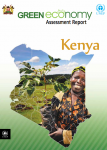 15 April 2014: Kenya’s transition to a green economy could result in higher natural resource productivity, a cleaner environment, increased food security and an estimated US$45 billion in economic benefits by 2030, according to a study launched by the UN Environment Programme (UNEP) and the Government of Kenya.
15 April 2014: Kenya’s transition to a green economy could result in higher natural resource productivity, a cleaner environment, increased food security and an estimated US$45 billion in economic benefits by 2030, according to a study launched by the UN Environment Programme (UNEP) and the Government of Kenya.
The ‘Green Economy Assessment Report: Kenya,’ examines the benefits of green investment in the agriculture, energy, manufacturing and transport sectors, using different scenarios. UNEP Executive Director Achim Steiner said the “report confirms that [Kenya] can achieve even greater prosperity and well-being by scaling up its green investments in key sectors, while also factoring the conservation and efficient use of its natural capital into future decisions.”
Green economy investments would increase average agricultural yield by 15%, according to the report. It outlines the benefits of scaling up agro-forestry and sustainable water management and recommends supporting organic farming and fish farming.
Under a green economic scenario, Kenya’s aggregated greenhouse gas (GHG) emissions would decrease 9% by 2030. The report highlights Kenya’s national climate change response strategy and aim of moving towards a low-carbon development pathway.
In the energy sector, green energy investments could contribute to an increase in renewable energy, including a doubling of geothermal capacity by 2030 and a 20% increase in the share of renewables in the total power supply. The report recommends the Government accelerate these efforts through: additional investments in biofuel, geothermal, solar and wind energy; and clean energy solutions for households and institutions, such as energy efficient lighting.
The report recommends greening the manufacturing sector, one of the largest in Sub-Saharan Africa, by encouraging and incentivizing investment in clean and resource-efficient production processes and recycling.
To reduce emissions in the transport sector, the report recommends: promoting mass transit and non-motorized transport; integrating land use and transport planning; and lowering the age of freight and passenger fleets.
The report recommends additional government action to, inter alia: develop national standards; improve regulatory compliance and resource efficiency; and introduce fiscal instruments, such as tax rebates on environmentally-friendly technologies.
The study concludes that a green economy transition can serve as an enabler for poverty alleviation, green job creation and sustainable development in Kenya, with “significant positive returns” within seven to ten years.
The Kenya Institute for Public Policy Research and Analysis (KIPPRA) conducted the study with support from the Millennium Institute and the International Institute for Sustainable Development (IISD). [UNEP Press Release] [Publication: The Green Economy Assessment Report: Kenya]